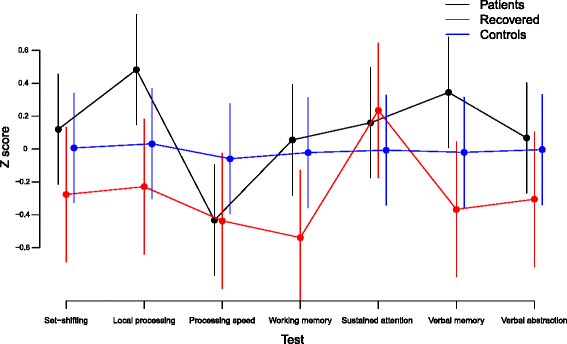Neurocognitive functions and social functioning in young females with recent-onset anorexia nervosa and recovered individuals
- PMID: 28261479
- PMCID: PMC5327534
- DOI: 10.1186/s40337-017-0137-3
Neurocognitive functions and social functioning in young females with recent-onset anorexia nervosa and recovered individuals
Abstract
Background: Young individuals with anorexia nervosa (AN) or recovered from AN display impairments of social function. To date, however, it is not clear whether they differ from controls with respect to neurocognitive performance and whether those functions contribute to the compromised social function observed in individuals with AN.
Methods: We included 43 young females with first-episode AN, 28 individuals recovered from adolescent-onset AN, and 41 control individuals (14-22 yr), all without comorbid autism spectrum disorder. We compared the performance of participants across groups in seven neurocognitive functions relevant to social functioning: set-shifting, local processing, processing speed, working memory, sustained attention, verbal memory, and verbal abstraction. Further, we tested the association between neurocognitive function and social function, measured by Autism Diagnostic Observation Schedule (ADOS), with an ordinal logistic regression model.
Results: First, participants did not differ on any neurocognitive function across groups. Second, only the neurocognitive function "verbal memory" was significantly associated with social function. Higher performance in verbal memory was associated with lower odds of impaired social function. Diagnostic group remained a significant factor, but the absence of an interaction between group and neurocognitive performance indicated that the association between verbal memory and social function was independent of group membership.
Conclusion: Young individuals with AN and those recovered from AN did not differ from controls with respect to neurocognitive performance. Verbal memory was associated with social function in all groups.
Keywords: Adolescents; Anorexia nervosa; Neurocognition; Recovered; Social function; Verbal memory.
Figures
References
-
- WHO . The ICD-10 Classification of Mental and Behavioural Disorders: Clinical Descriptions and Diagnostic Guidelines. Geneva: World Health Organization; 1992.
-
- Bentz M, Jepsen JR, Pedersen T, Bulik CM, Pedersen L, Pagsberg AK, et al. Impairment of social function in young females with recent onset anorexia nervosa and recovered individuals. J Adolesc Health. 2017;60:23–32. - PubMed
LinkOut - more resources
Full Text Sources
Other Literature Sources


